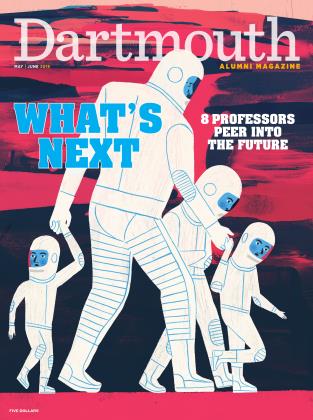Flawed Hero
CHRISTOPHER S. WREN ’57
WREN FRAMES HIS FAST-PACED HISTORY OF THE REVOLUTIONARY War in Vermont and New Hampshire around Ethan Allen and other colonial leaders, but the book’s heroes are ordinary Americans. “I wanted to tell how hard it was to fight in that war,” Wren tells DAM. “We have this vision of parades and drums and waving flags. No—this was gutter warfare.”
To write about war and suffering, it helps to have experienced both. Wren won renown as a New York Times foreign correspondent. Before that, he served as an Army infantry platoon leader in South Korea. “Eve been miserable and hungry enough to put myself in the boots of colonial soldiers—even though they were often barefoot,” says Wren. He writes of starving militia men stewing “a phantom broth” from leather cartridge boxes and devouring a pet Newfoundland dog, “paws and all.” He tells of teenage soldier Ebenezer Fletcher, who, wounded m battle and abused by his British captors, fled to the woods wearing a dead man’s boots. And he recounts the grisly fate of Vermonter JaneMcCrea. On the way
to visit her Redcoat fiance, she was accidentally shot by a Continental soldier as she was being abducted by Indians, who then scalped her “lustrous hair.”
Wren wrestles with Allen’s confounding behavior. A 1760s vigilante, he fought New York’s illegal land grab in New Hampshire. Along with Benedict Arnold, he seized strategic Fort Ticonderoga. Afterward, while the diligent Arnold inventoried captured war materiel, Allen binged on rum. Soon thereafter, the British took him prisoner and held him for 32 grueling months. On his release, Allen toured POW camps and denounced their despicable conditions. “He was like John McCain—he stood up to his captors,” Wren says. Later Allen secretly sought a separate peace with England, infuriating Washington. “We like to think of Allen as a great hero, but he was a flawed man who helped save the American revolution,” says Wren. “And he didn’t like New Yorkers.”
George M. Spencer
For an excerpt from Those Turbulent Sons of Freedom, go to our website.
 View Full Issue
View Full Issue
More From This Issue
-
 Cover Story
Cover StoryWhat’s Next
MAY | JUNE 2018 By TIFFANIE WEN -
 Feature
FeatureOut of This World
MAY | JUNE 2018 By MARK NELSON '68 -
 Feature
FeatureOut of the Amazon
MAY | JUNE 2018 By ANDREW FAUGHT -
 YOUR TURN
YOUR TURNYOUR TURN
MAY | JUNE 2018 -
 OUTSIDE
OUTSIDEAt the Mercy of the Mountain
MAY | JUNE 2018 By LANCE TAPLEY ’66 -
 INTERVIEW
INTERVIEW“Take the Right Risks”
MAY | JUNE 2018 By BETSY VERECKEY
George M. Spencer
-
 pursuits
pursuitsFirst
NOVEMBER | DECEMBER 2018 By George M. Spencer -
 FEATURE
FEATUREThe Future of Money
MAY | JUNE 2019 By GEORGE M. SPENCER -
 PURSUITS
PURSUITSA Ministry of Imagery
MAY | JUNE 2019 By George M. Spencer -
 pursuits
pursuitsCommand Performance
SEPTEMBER | OCTOBER 2019 By George M. Spencer -
 PURSUITS
PURSUITSWild Thing
SEPTEMBER | OCTOBER 2019 By George M. Spencer -
 PURSUITS
PURSUITSBound for Glory
NOVEMBER | DECEMBER 2019 By George M. Spencer
Pursuits
-
 pursuits
pursuitsOrganic Options
JANUARY | FEBRUARY 2018 By Abigail Drachman-Jones ’03 -
 pursuits
pursuitsPlaying It Forward
MARCH | APRIL 2018 By Annie Phifer ’20 -
 pursuits
pursuitsBig League
JULY | AUGUST 2022 By Charlie Pike ’22 -
 PURSUITS
PURSUITSPrincess of Tides
MAY | JUNE 2019 By George M. Spencer -
 pursuits
pursuitsBurger Queen
NOVEMBER | DECEMBER 2019 By Rick Beyer ’78 -
 PURSUITS
PURSUITSThe Right Stuff
JULY | AUGUST 2020 By Sarah Clark ’ll

